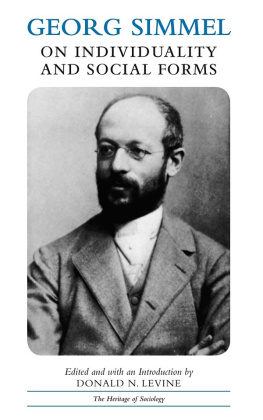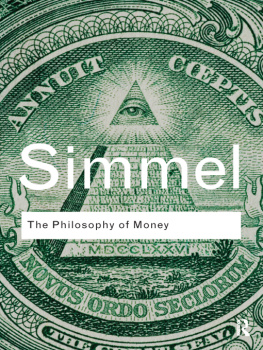Originally published in 1925 by The University of Chicago Press.
Published 2004 by Transaction Publishers
Published 2017 by Routledge
2 Park Square, Milton Park, Abingdon, Oxon OX14 4RN
711 Third Avenue, New York, NY 10017, USA
Routledge is an imprint of the Taylor & Francis Group, an informa business
New material this edition copyright 2004 by Taylor & Francis.
All rights reserved. No part of this book may be reprinted or reproduced or utilised in any form or by any electronic, mechanical, or other means, now known or hereafter invented, including photocopying and recording, or in any information storage or retrieval system, without permission in writing from the publishers.
Notice:
Product or corporate names may be trademarks or registered trademarks, and are used only for identification and explanation without intent to infringe.
Library of Congress Catalog Number: 2004044021
Library of Congress Cataloging-in-Publication Data
Spykman, Nicholas J. (Nicholas John), 18931943.
The social theory of Georg Simmel / Nicholas J. Spykman ; with a new introduction by David Frisby.
p. cm.
Originally published: Chicago : University of Chicago Press, 1925.
Includes bibliographical references and index.
ISBN 0-7658-0571-5 (pbk.: alk. paper)
1. Simmel, Georg, 18581918. 2. Sociology. I. Frisby, David. II. Title.
HM477.G3S79 2004
301dc21 2004044021
ISBN 13: 978-0-7658-0571-3 (pbk)
I
W HEN Nicholas Spykman published his volume on Georg Simmels social theory in 1925, he was dealing with a German social theorist who, some fifteen years earlier, had already had more articles published in English translation in the United States than any other European sociologist. Between 1893 and 1910 thirteen extracts from Simmels words were translated and published in English, the majority of which were translated by Albion Small, the editor of the American Journal of Sociology and published in that journal. Just how significant Smalls role was in promulgating Simmels sociology in America is revealed in the opening remarks of his review of Spykmans book.
Nearly thirty years ago the editors of this Journal cherished the identical purpose which the author of this book indicates in his Preface. They wanted to stimulate social scientists in the English-speaking world to begin with the beginnings by devoting themselves to fundamental problems of methodology. They believed that no better center of attention could be selected than that proposed by Simmel. They accordingly arranged to publish the series of his articles, starting in 1896, which he later incorporated into his Soziologie. These papers, beginning with Superiority and Subordination as Subject-Matter for Sociology, appeared in fourteen parts, the latest in 1910. We fondly hoped that not only sociologists but social scientists in general in all the English-speaking countries would respond, if not to the extent of adopting Simmels theories, at least to the extent of general admission that science without a recognized methodology is unthinkable. Up to the present time the Americans who have given indubitable evidence of having considered Simmel thoroughly might be counted on the fingers of one hand.
Small concedes, however, that the success of the editions of the AJS, and especially himself, in promulgating some of the issues raised by Simmels sociology was minimal. He hopes for this reason that Dr. Spykman will prove to have done for Simmel and for social science what this Journal was unable to do thirty years ago.
Despite his doubts and qualifications with respect to Simmels sociological program, Small was still convinced thirty years later that Simmels sociological legacy should not be ignored. Indeed, it remained one of the key European tendencies that American sociology would be ill advised to ignore. For, in Smalls view,
American sociology will remain provincial unless it maintains vital relations with the two European movements which seem likely to be the path-breakers in continental sociology during its next stage of development. The one tendency we have ventured to call post Simmelismin Germany. The other is the reorganization of the Durkheim following in France. It would be inviting disaster if American sociologists should act as though they could afford to be ignorant of either of these movements. Dr. Spykmans book is a sufficient and an indispensable pathfinder for the beginning of the former tendency.
Whatever the judgement on Smalls predictions and identification of the two leading European tendencies in sociology, it is clear that the reception of continental European traditions was contingent upon the availability of their work in English translation.
In Simmels case, the extent of translations of his work was ostensibly impressive. Thirteen articles published in English translation between 1893 and 1910, the majority in the AJS, exceeded the availability of the work of any other European sociologist in this period. In addition, the reception of Simmels work in the form of journal reviews was also extensive. However, such impressive indicators of the reception of Simmels social theory in the United States should be set against two contrary factors.
First, although extracts were translated from articles that were to make up or did already constitute chapters in his two major works, The Philosophy of Money (1900/1907) and Soziologie (1908) and published in the AJS, neither these nor any of Simmels monographs appeared in English translation in this period. This is despite their positive reception, as evidenced by the reviews, for example, of The Philosophy of Money by George Herbert Mead Indeed, The Philosophy of Money only appeared in English translation in 1978 and, although the majority of the chapters that make up Simmels Soziologie are available in translation, the whole volume itself is still not published in English.
Second, and equally pertinent to the impact of Spykmans monograph, this surge in translations from the mid 1890s to 1910 ceased in 1910 and was not renewed until 1949-50, in particular with Kurt H. Wolffs influential, edited collection The Sociology of Georg Simmel in 1950. In the intervening forty years only Simmels essay on sociability appeared in the public domain. Amongst these students in Germany had been Small himself and, more recently, Park and Mead.
However, we should not imagine that the reception of German social theory by American students was always favorable. Small, for example, had encouraged his student Woodhead to study in Berlin. Commenting on Simmels lectures in a letter to Small in 1904 Woodhead writes:
Simmel soared, I could not get any where near him at first. In the philosophy course I got to him one day, but the rest of the time I fluttered heavily along the ground while he was in the clouds. With the sociology I was much better pleasedthough those who understood the philosophy better than I, got nothing from the sociology. His work is mostly suggestive. His material needs working over. Its good, necessary work, but not any where nearly so final as he thinks it is. When I hear Simmel and Dewey, and such men I wonder if they couldnt present their material more clearly if they would work it over just a little more, clearing away the brush and the dead limbs. If the subject were grasped subjectively a little more firmly and surelyand presented in a style having the literary qualities of simplicity and perspicuityit would be much more get-at-able.














